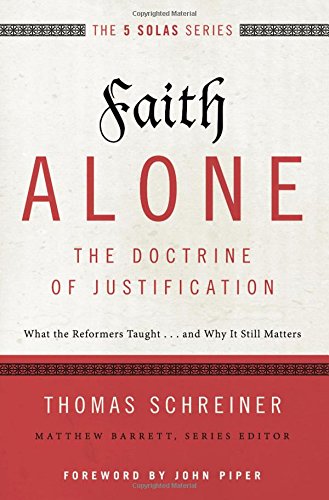Introduction
This book is part of The Five Solas Series that investigates the solas of the Reformation. Schreiner provides a theological, historical, and exegetical survey of the doctrine of justification by faith alone. He argues that the traditional, Reformed interpretation of justification is fundamentally accurate and vitally important. Schreiner interacts with contemporary Roman Catholic and Protestant views that differ from the Reformed understanding. This work is irenic but firm in its articulation of sola fide.
Table of Contents
Chapter 1 Sola Fide in the Early Church
Chapter 2 Martin Luther on Justification by Faith Alone
Chapter 3 John Calvin on Justification by Faith Alone
Chapter 4 Sola Fide and the Council of Trent
Chapter 5 Glimpses into Further Reformed Discussions on Sola Fide: The Contributions of John Owen, Richard Baxter, and Francis Turretin
Chapter 6 The Status of Sola Fide in the Thought of Jonathan Edwards and John Wesley
Chapter 7 Human Sin
Chapter 8 Faith Alone
Chapter 9 Faith in Jesus Christ
Chapter 10 The Importance of Justification in Paul
Chapter 11 God’s Saving Righteousness
Chapter 12 Righteousness is Eschatological
Chapter 13 Righteousness is Forensic
Chapter 14 The Righteousness of God
Chapter 15 Imputation of Righteousness
Chapter 16 The Role of Good Works in Justification
Chapter 17 Sola Fide and the Roman Catholic Church
Chapter 18 Frank Beckwith’s Return to Rome
Chapter 19 N. T. Wright and the New Perspective on Paul
Chapter 20 New Perspective on Paul: The Sin of Israel and the Rejection of Imputation
Chapter 21 A Concluding Word
Summary
Chapters 1 -3
Sola Fide in the Early Church
Martin Luther on Justification by Faith Alone
John Calvin on Justification by Faith Alone
There is a debate about how accurately the church fathers comprehended Paul’s teaching on salvation by grace through faith alone. They knew that salvation was from the Lord, but their concerns were often with antinomianism and the necessity of obedience and good works. Until the time of Augustine, theologians didn’t wrestle with the relationship between faith and works. The term justification refers to being right with God, or how we attain righteousness. Most early church fathers understood justification forensically. For Clement, good works flowed from faith but were not the foundation for justification. Ignatius urged his readers to do good works and endure, but salvation came through faith. The Epistle to Diognetus and the Odes of Solomon likewise teach that salvation is by God’s grace and righteousness is by faith. The doctrine of justification by faith was not spelled out with precision at this stage in the life of the church, and there was a strong emphasis on the necessity of works. Augustine’s view was that salvation is entirely by grace, but he believed that justification involved making someone righteous rather than declaring them righteous. He held that justification was a process (collapsing justification and sanctification into the same process). Works did not save but faith would produce the works of love. Although none of the church fathers spoke with the precision of the Reformers on the subject of justification by faith alone, they did not deny the doctrine, and there is good evidence that they held to it in an inchoate form.
Because of Augustine, medieval theologians understood justification to refer to believers being made righteous. Luther and the Protestants came to understand justification as a forensic declaration, a status. It was distinguished from sanctification, and it was based on the imputation of the alien righteousness of Christ. Luther believed that justification by faith was essential. Sinners cannot be right in the sight of God on the basis of works since they can’t keep the law. Sinners can only be right with God by receiving an extrinsic righteousness—the righteousness of Christ. Faith is the necessary instrument to appropriate Christ. Christ takes our sins and by faith—which is the gift of God—we receive his righteousness. Believers are justified and yet still sinners. Good works are not the grounds for our justification but they are the necessary evidence of saving faith. In contemporary thought, the Finnish school is attempting a reinterpretation of Luther’s view of justification, but so far their work has fallen short. The traditional interpretation of Luther is still the most accurate.
Justification was also of central importance in the thought of John Calvin. He argued that our sins…
[To continue reading this summary, please see below....]The remainder of this article is premium content. Become a member to continue reading.
Already have an account? Sign In
